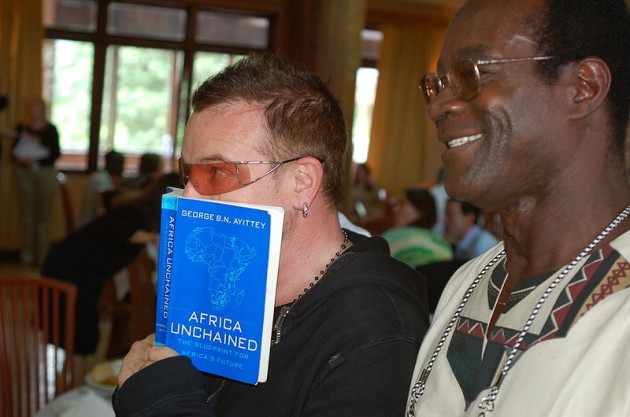I recently posted about Leonard Read’s “I, Pencil” and the religious context of Adam Smith’s “invisible hand.” The combination of the two provides a nice context for the following. Allow me to introduce an updated take on “I, Pencil” produced by the Institute for Faith, Work & Economics:
Politics
PC Skepticism vs. Genuine Harassment

I think one of the biggest sources of misunderstanding between conservatives and liberals is the perception of how each approaches issues dealing with minorities. My take is that everyone agrees things like sexism, racism, and homophobia exist, are bad, and should be confronted. But conservatives have a sense that liberals sometimes exaggerate the problems for political gain or just to feel good about having something to crusade against. This skepticism from conservatives–which I admit I share–causes liberals to accuse conservatives of apathy or denialism.
What’s the truth? I don’t know, but the more time I spend following issues of how geeks in particular treat women the more I’m starting to think the problem is deeper than I had realized. John Scalzi (famous sci fi author) covers this issue quite frequently, and here is his latest alarm.
Basically: a creep is cyber-stalking women using Storify, the Storify CEO not only refuses to intervene but also notifies the cyberstalker that he’s being scrutinized, apparently leading to hordes more men piling on the women who were being harassed to begin with. What’s up with this kind of nonsense?
Malice Towards None: Orson Scott Card, Gay Marriage, and the “Ender’s Game” Film Controversy, Part Two

Note: This is the second part of this essay. Part one can be found by clicking here.
“It was just him and me. He fought with honor. If it weren’t for his honor, he and the others would have beaten me together. They might have killed me, then. His sense of honor saved my life. I didn’t fight with honor… I fought to win.”
–Ender’s Game
“Somebody with that much compassion could never be the killer we needed. Could never go into battle willing to win at all costs. If you knew, you couldn’t do it. If you were the kind of person who would do it even if you knew, you could never have understood [them] well enough.”
—Ender’s Game
Perhaps one of the most troubling things to me about the whole Ender’s Game boycott is the chill and fear it creates not only for those who, on personal, religious or ethical grounds, oppose gay marriage, but also to those who choose to work and associate with them. In these scenarios, all tainted parties are punished, even those who happen to be supportive with the gay rights movement. It’s a modern McCarthyism, creating a feeling that all people who do not pass that sociopolitical litmus test must be shunned and, if you do not shun them as well, you’re suspect as well. Thus, in the case Ender’s Game, Lionsgate, Harrison Ford, Gavin Hood, Asa Butterfield, and the rest of the cast and crew of the film would be punished by this kind of attitude, even though they have all come out staunchly in the favor of gay rights, and insist the story of Ender’s Game is a story about compassion and empathy, so has nothing to do with Card’s stance on gay marriage.
Fortunately, a lot of the more level headed members of the liberal community see the implications of such actions. Juliet Lapados at the New York Times, even though she hardly agrees with Card’s more extreme views, called out this sort of action:
Generally, boycotts are used to pressure companies or governments to end objectionable activities; consider the boycott of Chick-fil-A to protest the chain’s financial support of antigay organizations. What Geeks Out has in mind is closer to blacklisting. The group wants to “send a clear and serious message to Card and those that do business with his brand of antigay activism — whatever he’s selling, we’re not buying.” This isn’t about stopping the dissemination of antigay sentiments; it’s about isolating Mr. Card and shaming his business partners, thus cutting into their profits.
If Mr. Card belongs in quarantine, who’s next?
Bono: Africa Unchained
Everyone loves Bono. He’s a good man. And U2 rocks. He has also been one of the strongest proponents of foreign aid. This is why the following has come as a bit of a shock:
Foreign aid has been blasted by the likes of economists William Easterly and Dambisa Moyo. But Bono? While not blasting it per se (not all aid is created equal, mind you), he recognized that it is economic development that is the key to reducing poverty. As The Economist recently reported,
The world’s achievement in the field of poverty reduction is, by almost any measure, impressive. Although many of the original [Millennium Development Goals]—such as cutting maternal mortality by three-quarters and child mortality by two-thirds—will not be met, the aim of halving global poverty between 1990 and 2015 was achieved five years early…The MDGs may have helped marginally, by creating a yardstick for measuring progress, and by focusing minds on the evil of poverty. Most of the credit, however, must go to capitalism and free trade, for they enable economies to grow—and it was growth, principally, that has eased destitution…[T]he biggest poverty-reduction measure of all is liberalising markets to let poor people get richer. That means freeing trade between countries (Africa is still cruelly punished by tariffs) and within them (China’s real great leap forward occurred because it allowed private business to grow). Both India and Africa are crowded with monopolies and restrictive practices.
Many Westerners have reacted to recession by seeking to constrain markets and roll globalisation back in their own countries, and they want to export these ideas to the developing world, too. It does not need such advice. It is doing quite nicely, largely thanks to the same economic principles that helped the developed world grow rich and could pull the poorest of the poor out of destitution.

Bono appears to have grasped this concept (he is a self-proclaimed “evidence-based activist”). And he rocked it at Georgetown University (if for nothing more than his Bill Clinton impression). He spoke of how “it’s not just aid. It’s trade, it’s investment, it’s social enterprise. It’s working with the local citizenry to help them unlock their own domestic resources so they can do it for themselves. Think anyone in Africa likes aid? C’mon.” He said that the hero will be “the nerd” and, more specifically, “Afro-nerds.” These individuals have been using technology and social media to expose government corruption and increase transparency.

Where did this come from? While it may have come from multiple sources, I’m willing to bet economist George Ayittey’s (above with Bono) impassioned TED speech and post-speech discussions with Bono had an influence. See why below.
A Titanic Blunder
My wife and I were trying to decide what to watch on NetFlix the other night and we somehow ended up watching Titanic: a film that was pretty good the first couple times (at least according to audiences and the Academy), but has worsened with each viewing.
But one scene in particular stood out to me with this viewing (no, not that scene). Recall as the young Rose (Kate Winslet) asked Thomas Andrews (Victor Garber) about the number of lifeboats, Andrews answered that there were only enough boats for about half the passengers. The reason? The deck would look too cluttered. This reminded me of a Wall Street Journal article from last year that was written for the 100th anniversary of Titanic’s sinking. The author, Australian columnist Chris Berg, explains that
the Titanic was fully compliant with all marine laws. The British Board of Trade required all vessels above 10,000 metric tonnes (11,023 U.S. tons) to carry 16 lifeboats. The White Star Line ensured that the Titanic exceeded the requirements by four boats. But the ship was 46,328 tonnes. The Board of Trade hadn’t updated its regulations for nearly 20 years.
Why no regulatory updates?
It had been 40 years since the last serious loss of life at sea, when 562 people died on the Atlantic in 1873. By the 20th century, all ships were much safer. Moreover, the passage of time changed what regulators and shipowners saw as the purpose of lifeboats. Lifeboats were not designed to keep all the ship and crew afloat while the vessel sank. They were simply to ferry them to nearby rescue ships…Had Titanic sunk more slowly, it would have been surrounded by the Frankfurt, the Mount Temple, the Birma, the Virginian, the Olympic, the Baltic and the first on the scene, the Carpathia. The North Atlantic was a busy stretch of sea. Or, had the Californian (within visual range of the unfolding tragedy) responded to distress calls, the lifeboats would have been adequate for the purpose they were intended—to ferry passengers to safety.
Yet, Cameron’s fictionalized account of the tragedy supposedly brought on by greed and aesthetics “hinges on a crucial conversation between Alexander Carlisle, the managing director of the shipyard where Titanic was built, and his customer Bruce Ismay, head of White Star Line, in 1910.” Carlisle proposed 48 ships, but Ismay and others rejected “on the grounds of expense.” But as Berg demonstrates, this too is untrue:
In the Board of Trade’s post-accident inquiry, Carlisle was very clear as to why White Star declined to install extra lifeboats: The firm wanted to see whether regulators required it. As Carlisle told the inquiry, “I was authorized then to go ahead and get out full plans and designs, so that if the Board of Trade did call upon us to fit anything more we would have no extra trouble or extra expense.” So the issue was not cost, per se, or aesthetics, but whether the regulator felt it necessary to increase the lifeboat requirements for White Star’s new, larger, class of ship. This undercuts the convenient morality tale about safety being sacrificed for commercial success that sneaks into most accounts of the Titanic disaster.
Nobody in the industry questioned the judgment of the Board of Trade. This was no longer the industry’s responsibility, but the board’s. The “private risk management” of business had evolved into mere “regulatory compliance.” As Berg notes,
This is a distressingly common problem. Governments find it easy to implement regulations but tedious to maintain existing ones—politicians gain little political benefit from updating old laws, only from introducing new laws. And regulated entities tend to comply with the specifics of the regulations, not with the goal of the regulations themselves.
While many things went wrong in the case of the RMS Titanic, when it comes to the number of lifeboats, Berg gets it right: “British regulators assumed responsibility for lifeboat numbers and then botched that responsibility.”
Policymakers, take notice.
The Slow Hunch: Uncertainty Still Undervalued
Rex Nutting at MarketWatch has a recent article claiming that economic policy uncertainty had nothing to do with the sluggish recovery. I beg to differ. Check out my brief response at my blog The Slow Hunch.
Malice Towards None: Orson Scott Card, Gay Marriage, and the “Ender’s Game” Film Controversy, Part One
“But mostly he got to power on words, the right words at the right time.”
—Ender’s Game

With the upcoming release of the Ender’s Game film, adapted from Orson Scott Card’s novel (which is rightly considered a sci-fi classic), a flurry of controversy is building up around the release, especially since Geeks OUT called for a boycott of the film due to Orson Scott’s Card vocal views on homosexuality and gay marriage (some of Card’s views on the subjects can be found a little more rationally in his early work here, and a lot less rationally in his later work here). This is not the first time this issue has come back to haunt Card recently, as DC Comics had to temporarily shelve a Superman story Card had written for them due to some backlash the company had received about Card’s views (even to the point of the artist leaving the project). And, frankly, I can totally understand why the gay community wants to color Card as a boogeyman when he issues incendiary, inflaming, alienating statements like this:
How long before married people answer the dictators thus: Regardless of law, marriage has only one definition, and any government that attempts to change it is my mortal enemy. I will act to destroy that government and bring it down, so it can be replaced with a government that will respect and support marriage, and help me raise my children in a society where they will expect to marry in their turn.
Biological imperatives trump laws. American government cannot fight against marriage and hope to endure. If the Constitution is defined in such a way as to destroy the privileged position of marriage, it is that insane Constitution, not marriage, that will die (Deseret News, July 24, 2008).
Now, whoa there, pardner! This style of “vive la revolution” diatribe is seriously extreme, no matter one’s belief system or worldview. And it’s also pretty impractical. This sort of rhetoric did much more to paint Card as a fanatic, than it did to rally the troops around Captain Moroni’s flag (I don’t actually think Card’s crazy, he’s actually really brilliant, but this particular article certainly made him LOOK crazy).
Card can hardly play the victim, nor be particularly surprised that the gay community has organized so thoroughly against him, when he says that he would prefer to see the government destroyed than let gay marriage stand in America. Statements like that are like holding a lightning rod in a thunderstorm. Card put too many of his RISK armies on one part of the board, and the opposition took advantage of his tactical error.
“I will remember this, when I am defeated. To keep dignity, to give honor where it is due, so that defeat is not a disgrace. And I hope I don’t have to do it often.”
—Ender’s Game
“Since when do you have to tell the enemy he has won?”
— Ender’s Game
Yet such brash words were obviously spoken in the heat of the moment since Card has now given up the fight, stepping down from his position on National Organization for Marriage, and has called the gay marriage debate “moot” (technically not correct, since there are still 37 states who still outlaw gay marriage, but I do think Card is prescient to see the writing on the wall). No revolution, no overthrowing the government, no going down with the ship… Card has presented the “enemy” with his sword and conceded defeat with this statement, “With the recent supreme court ruling, the gay marriage issue becomes moot. The full faith and credit clause of the constitution will, sooner or later, give legal force in every state to any marriage contract recognized by any other state.”
“I, Pencil” and the Providential Invisible Hand
In the December 1958 issue of The Freeman, economics writer and FEE founder Leonard Read published his now-famous essay “I, Pencil.” The essay traced the “family tree” of the modern pencil, demonstrating the complexity of its creation and the numerous people involved. Nobel laureate Milton Friedman was so impressed with the essay that he used it in one of the episodes for his TV series Free to Choose. More recently, science writer Matt Ridley borrowed from the idea by declaring that literally nobody on the face of the planet knows how to build a computer mouse. Despite the individualistic rhetoric that often accompanies markets, Read’s essay provides a much needed reminder that markets on the whole are more communal, more cooperative, and more interdependent than the centralized planning that often employs these rhetorical fronts.
The discussion of the “invisible hand” toward the end is almost spiritual in nature. And with good reason. As Peter Harrison, historian and director of the Centre for the History of European Discourse at the University of Queensland, explains,
[D]uring the early modern period, in addition to increasing frequency of occurrence, we witness the emergence of a more distinct pattern of use or, more correctly perhaps, of two related concepts of the operation of ‘‘the invisible hand.’’ Most commonly the invisible hand was used to refer to the manner in which God exercised providential control over the course of history by subtly influencing human actions in order to bring about his ends. These ends are thus accomplished in spite of the intentions of human actors and without their knowledge. The second pattern of usage also refers to God’s providential action, but in the context of his superintendence of the natural world. Thus God’s invisible hand was glimpsed in the contrivances of the creatures and in the wisdom and foresight evidenced by the laws of nature, which again promote his ends. These two conceptions between them represent the most predominant uses of the expression in the seventeenth and eighteenth centuries and hence the most relevant background for Smith’s uses of the expression.[ref]Peter Harrison, “Adam Smith and the History of the Invisible Hand,” Journal of the History of Ideas 72:1 (2007): 33.[/ref]
Just as the laws of nature were originally seen as “exemplif[ying] design, so too…did the laws of morality.” For Smith and his contemporaries, “the general laws of the moral, as well as of the material world, are wisely and beneficently ordered for the welfare of our species.”[ref]Ibid.: 46.[/ref]
Seems to be working out alright.
“Job Creation” Is Easy…And Sort Of Misses the Point
Nathaniel’s recent post on minimum wage touches on a couple of important–if not overlooked–points about the “job creation” debate: (1) innovation vs. job preservation and, implicitly, (2) wealth vs. jobs. If the goal is to create jobs for the sake of creating jobs, then the task is pretty straightforward.
As economist Steven Horwitz says above, “I would argue that creating jobs is easy; it’s the creation of wealth that’s hard.” The creation of wealth is intrinsically linked with innovation and the “creative destruction” it brings about. Even though many have partaken of what Scott Winship of the Brookings Institution calls “technophobia” (remember Jesse Jackson Jr.’s claim that the iPad was “eliminating thousands of American jobs” or the President’s concern that the ATM represented a “structural issue” in the American economy?), the fear is unjustified.
Arguing against technological progress because it “destroy jobs” ignores the mass benefits that will follow, including the rise in absolute standards of living. “In a free-market economy,” explains historian Thomas E. Woods,
businesses invest the vast bulk of their profits in capital goods that make labor more productive…[Different] kinds of machinery can multiply the efficiency of a single worker many times over, sometimes by orders of magnitude…This is how wealth is created: we can produce more with the same (or a lesser) amount of labor…As a result of capital investment, firms can now produce many, many times more goods than before, and at considerably lower cost. Thanks to the pressures of market competition, firms pass on these cost cuts to consumers in the form of lower prices, better quality merchandise, or a combination of both. The ordinary person’s standard of living increases…because business firms can invest in machinery that makes it possible for more and more goods to be produced with fewer and fewer hands, thereby increasing the overall amount of material goods available and rendering them less and less expensive.[ref]Thomas E. Woods, Jr., 33 Questions About American History You’re Not Supposed to Ask (New York: Three Rivers Press, 2007), 168.[/ref]
A higher minimum wage will not help raise the poor out of poverty. It will simply eliminate jobs for low-wage workers (i.e. high school education and less).
But couldn’t one argue that technological advances eliminate low-wage jobs? Sure. But the difference is that minimum wage laws provide only a slight financial bump for some low-wage workers, while keeping others in the unemployment line. Innovation creates new jobs for low-wage workers, while raising the absolute standards of living for everyone (including the poor). When given these options, I would hope the choice is obvious.
Minimum Wage Follies
One of the perennial conflicts between left and right in the United States is over minimum wage. The left insists that it’s a crime (at least morally) for companies to pay their employees less than a living wage and lauds companies that have business models based on paying workers well (or “fairly”, as those on the left might insist). The right, for its part, has the general attitude that if you’re expecting a living wage for a minimum wage job, there’s something wrong with you, not with the wage. Minimum wage jobs are for teenagers or retired folks looking for a little spending money or are a way for anyone who wants to work to have easy access to the bottom rung of the job ladder.
Although I always think it’s nice when a company like Costco carves out a niche paying their employees well, I tend to sympathize with the right for simple economics. If you make it expensive for companies to hire employees, they will hire less employees. Thus the impact of minimum wage laws might be to boost salaries in the shot run, but in the long run it has the opposite effect. It reduces the salaries of large swathes of the populace to 0 by taking away their jobs completely.
This whole issue came to mind again when I heard a story about fast food workers striking for better pay. Really, guys?

